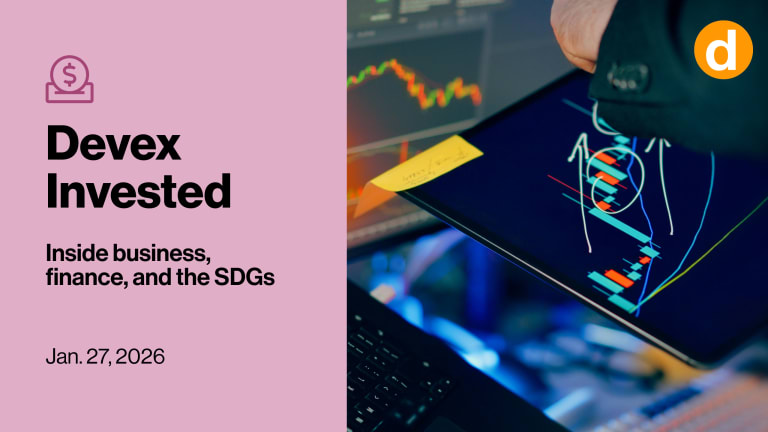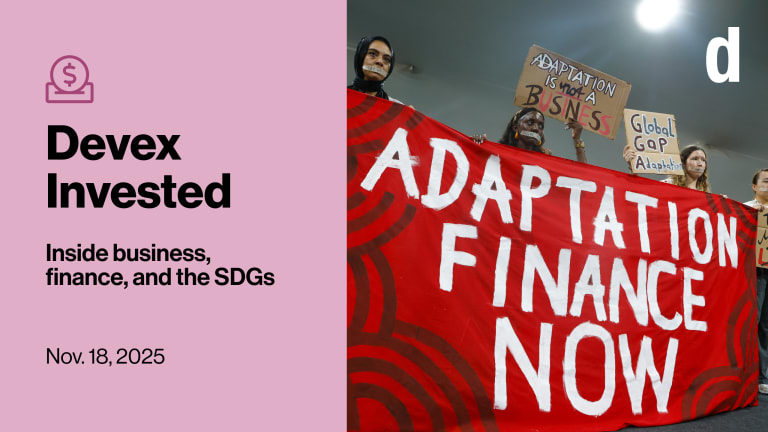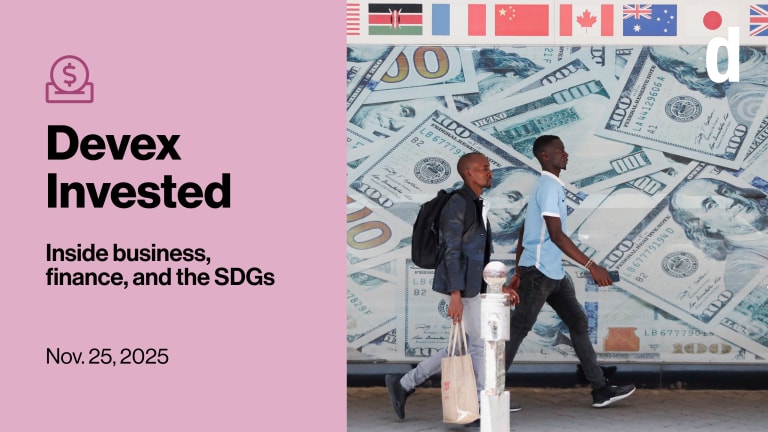Devex Invested: In Sevilla, the heat is on to get development finance back on track

With just six days to go before the Fourth International Conference on Financing for Development, or FfD4, global leaders are preparing to gather in sun-scorched Sevilla, Spain, where temperatures are expected to approach 43 degrees Celsius (110°F). (Pack a hat. And maybe a fan.)
Last week, we learned that the U.S. is sitting this one out: U.S. representative Jonathan Shrier said that the text of a global pact to finance the U.N. Sustainable Development Goals — which includes language on climate change and gender, as well as international trade and taxation — “crosses many of our long-standing red lines.” The pullout wasn’t entirely unexpected, as the U.S. had previously proposed more than 400 amendments to the text. And the U.S. exit has already led to progress, with the rest of the countries agreeing to a text just afterward.
Shari Spiegel, the director of the financing for sustainable development office at the United Nations Department of Economic and Social Affairs, tells me that the rest of the world is moving forward without the U.S. Overall, countries celebrated the document. But some were disappointed with last-minute changes that removed some language on climate change in order to gain consensus, as well as an intention from the Europeans to “disassociate” themselves with an intergovernmental process that would recommend improvements for the global debt architecture.
“The world is coming together,” Spiegel says. “Of course, it’s always great to have the biggest economy in the world be part of the discussions, but the rest of the world wants to come together to move this forward and to make an agreement.”
With the outcome agreement already drafted, Spiegel — the behind-the-scenes force helping steer global consensus at FfD for the next 10 years of development priorities — says Sevilla will be a “starting point for implementing a new framework and new ways of thinking about how to get some of the financing back on track.”
She says that discussions will focus on the Sevilla Platform for Action, which will outline how to implement the goals outlined in the document.
Despite the positive outlook, Speigel would have preferred to have the U.S. as a productive participant in the conference. “It’s true that some of these actions need the U.S. as the major shareholder in some of the [international financial institutions],” she says. “There are actions that do need the U.S. participation in the end.”
→ Will you be in Sevilla? I’d love to meet Invested readers. Drop me a line at jesse.chaselubitz@devex.com.
Read: A Q&A with the woman who helped shape the Sevilla Platform for Action (Pro)
And ICYMI: US abandons Financing for Development conference
+ This Thursday, June 26, as part of our Road to Sevilla series, I will be doing a live interview with Rémy Rioux, CEO of the French development agency AFD. We’ll dive into the evolving role of European development finance institutions in the current aid landscape; innovative financing solutions for issues such as debt, private investment; and domestic resource mobilization, and what to expect in the future of development financing. Register for the event here.
If you’re planning to be in Sevilla, be sure to register to visit us at Casa Devex, where we’ll be hosting exclusive interviews and panels with development leaders at a Spanish villa between June 29 and July 1. Sign up here.
Broken promises
It’s worth remembering how far we’ve come — or not. Ten years ago, development officials met in Addis Ababa, Ethiopia, for FfD3 and the world agreed on an ambitious blueprint to fund the Sustainable Development Goals.
Addis succeeded in elevating financing for development on the international agenda — but a decade later, its core promises largely remain unmet, my colleague Elissa Miolene writes.
The Addis Ababa Action Agenda promised stronger domestic tax systems, expanded private sector finance, increased aid flows, and better access to global capital — all under the banner of “billions to trillions.” But that vision has unraveled: Aid is slipping. Foreign direct investment is down. Private capital has grown more risk-averse. And momentum on tax reform — once a pillar of the Addis agenda — has slowed to a crawl. Official development assistance, or ODA, of course, is crumbling, with the world’s seven richest countries poised to slash foreign aid spending by 28% next year. With trust between countries at a low point and the multilateral system under strain, many are wondering what, if anything, Sevilla can deliver.
Read: What happened at the last FfD conference, and what has changed since?
Background: What is Financing for Development 4 and why is it a big deal? (Pro)
Explore: All the news, reporting, and briefings leading up to FfD4
Déjà vu in Bonn
Negotiations at the midyear U.N. climate meetings in Bonn, Germany, opened with a 17-hour deadlock last week over whether to formally discuss public finance. Developing countries pushed for the agenda to include Article 9.1 of the Paris Agreement, which refers to the legal obligation of developed countries to provide public climate finance. But wealthy countries resisted, and the agenda was only adopted with a vague footnote committing to further “consultations.”
The fight echoes tensions at the COP29 annual U.N. climate conference last year in Baku, Azerbaijan, where developing countries reluctantly agreed to a $300 billion annual finance goal by 2035 — far short of the $1.3 trillion they had called for, and with no guarantee that the money would come from public sources. Many negotiators left that summit furious, and they arrived in Bonn ready to keep pushing.
“Article 9.1 speaks to the blood of the convention,” said Nkiruka Maduekwe, a negotiator for the Nigerian delegation and the director-general of the National Council on Climate Change, highlighting the centrality of public finance to the Paris Agreement.
The standoff could spell trouble for COP30 in Brazil this November. India has already warned that it will bring the issue back, and observers say Brazil is unlikely to want its presidency marred by another procedural brawl. But without a breakthrough in Bonn, the finance fight is almost certain to resurface in Belém. Some developed country delegations and civil society tell me that discussions seem to be moving away from public finance entirely, with consultations largely consisting of panels by private institutions explaining alternative financing options, rather than inviting feedback from civil society.
I’m in Bonn following the finance discussions closely. Keep an eye out for my reporting in the next couple of days.
Read: Climate negotiations in Bonn begin with familiar finance clash
Gambling on guarantees
Guarantees are the most underused tool in development finance, according to British International Investment CEO Leslie Maasdorp.
Speaking at a Devex Pro event ahead of FfD4, Maasdorp urged multilateral development banks and donors to scale up guarantees — which protect investors against risk — to unlock private capital in low- and middle-income countries. The sector is entering a new, uncertain era marked by shrinking aid budgets, a growing inward focus by wealthy nations, and the need for DFIs and MDBs to break away from donor-recipient models toward investment-driven development. “We need a change in mindset, a change in culture,” he said.
Meanwhile, BII has committed a record amount on climate finance. Yesterday, the institution announced that it invested £708 million ($903 million) in climate-related projects across emerging markets in 2024 — 41% of its total commitments and a dramatic rise from £80 million ($104 million) in 2020. Over the past three years, BII has directed more than $2 billion into climate finance, backing companies such as Kenya’s SunCulture and India’s EnerGrid.
Read: Are guarantees the most underrated tool in development finance? (Pro)
+ Curious about the insights that drive global development? Experience Devex Pro with a 15-day free trial. Explore expert analyses, unlock hidden funding opportunities, connect with key players at exclusive events, and access a wealth of knowledge you won’t find anywhere else.
Not another echo chamber
Your next job?
Underwriter (Sovereign Risks)
Islamic Corporation for the Insurance of Investment and Export Credit
Kazakhstan
The United Kingdom is floating the idea of a new international development summit — and while it’s encouraging to hear the U.K. Foreign Secretary David Lammy call for changes to the international aid system, any summit led by Western donors risks reinforcing the power imbalances it claims to address, Nana Asantewa Afadzinu, executive director of the West Africa Civil Society Institute, and Romilly Greenhill, CEO at Bond, write in an opinion piece for Devex.
In the lead-up to FfD4, the authors say that many countries are already doing the work — from pushing for a fair sovereign debt mechanism to calling for a new definition of ODA that reflects equity and accountability.
If the U.K. truly wants to lead, they say, it should stop designing conversations in Western boardrooms and start showing up to the ones already underway — led by low- and middle-income countries, civil society, and frontline communities. “Reforming international finance isn’t charity,” they write. “It’s about justice, shared interest, and responsible leadership.”
With the future of development finance up for debate at FfD4, this is a timely call to move beyond Western echo chambers — and toward a truly representative global agenda.
Opinion: A new development conference can’t be just a Western echo chamber
What we’re reading
Palladium CEO Sinéad Magill told U.K. lawmakers the firm could survive without FCDO contracts — even though they make up 80% of its U.K. work — as members of Parliament scrutinized the value and transparency of for-profit aid contractors. [Devex]
China-based Asian Infrastructure Investment Bank is planning a new London office amid rising tensions with the U.S., highlighting the complex balancing act for the U.K. between fostering global finance ties and managing geopolitical pressures. [Politico EU]
The Asian Development Bank, CGIAR, and the Gates Foundation are joining forces to overhaul Asia’s rice sector with a $1.5 billion push for climate-smart, low-emission farming [Global AgInvesting]
Climate finance continues to favor mitigation over adaptation, despite growing evidence that vulnerable developing countries urgently need more support for resilience. [World Economic Forum]
Search for articles
Most Read
- 1
- 2
- 3
- 4
- 5








